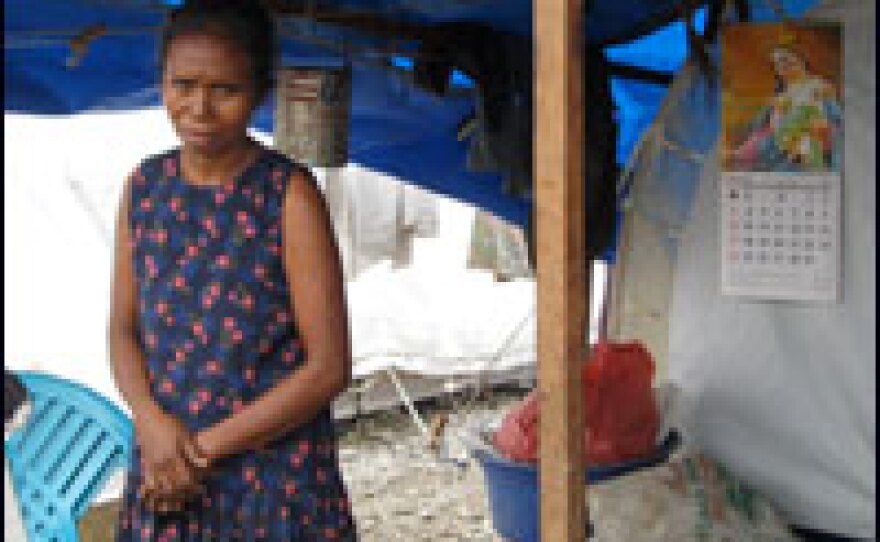



East Timor remains under a state of emergency after the country's president, Jose Ramos-Horta, was gravely wounded last week in simultaneous attacks by rebel soldiers on him and the country's prime minister, who was unhurt.
Many are wondering what's next for the tiny, impoverished country, which has been dogged by political instability — and violence — since it became independent in 2002 after a bloody split from Indonesia.
Two years ago, in May and June of 2006, many parts of the capital, Dili, were in flames.
Rival youth gangs from the east and the west of the country went on a rampage, burning and looting at will. More than 65,000 people were forced from — or burned out of — their homes and found refuge in makeshift camps before an Australian-led peacekeeping force contained the violence.
The fires are out now, but the camps — and the tension — remain. In fact, half of the families who fled their homes are still in the camps. Some 30,000 people in all are packed into simple, plastic tents donated by aid agencies.
Madalena De Silva lives in a camp at a Catholic school not far from the airport with her husband and eight children.
"We'd like to go home," she says. "But it's still not safe, especially at night."
Rebel Popular, Even in Death
De Silva says East Timor's politicians are to blame for the situation.
One of those political actors, President Ramos-Horta, is recovering in an Australian hospital after last week's attack. Another has been removed from the political arena for good.
The man accused of leading the attack on the president, former army Maj. Alfredo Reinado, was buried last Thursday. As many as a thousand people turned out for the funeral of a man some regard as a hero — a leader of the 2006 rebellion by several hundred soldiers from the west of the country, who complained of discrimination by those from the east.
That rebellion helped spark the violence that engulfed the capital soon after, yet Reinado remains popular, even in death, among many young people unemployed, disillusioned and desperate for something better.
"We came here today," 20-year-old Augusto says, "because we believed in Maj. Alfredo Reinado. We trusted him. And we looked up to him as someone who spoke the truth."
Another young man, Joao, agrees and describes the major with the same reverence people used to reserve for resistance hero Xanana Gusmao — now Prime Minister Gusmao — who led the fight against years of Indonesian occupation.
"I will be reluctant to make that comparison, but for some people, I can understand how they feel," says Joaquim Fonseca, an adviser to the prime minister. "I think this is a lesson that needs to be learned by this government, and it needs to be more inclusive; it needs to be addressing the real issues which are faced by the ordinary people in their daily lives."
Job creation is one such issue in a country where 40 percent of the people are unemployed, where many more live on less than a dollar a day, and where much of the infrastructure was destroyed by the Indonesians when they withdrew in 1999.
A Stalled Effort?
Last week's attacks on the president and the prime minister have created fears the country could be headed for even more political instability.
"The democracy is still very fragile," says Arsenio Bano, vice president of the main opposition party, Fretelin. "The society is so polarized. And it is time for political leaders of East Timor sitting together [to] figure out what [needs] to be done next."
But compromise doesn't come easily for Timor's political elite, Fretelin included. The elite know each other intimately and sometimes dislike each other immensely, and the country has a legacy of colonial rule, civil war and occupation by Indonesia.
"Most of us were involved in the struggle," Fonseca says. "We have ... all different kinds of relationships — some people were on one side, others were on the other side, and it's a habit to be suspicious. The level of suspicion is very high in the society, and this doesn't help."
Neither does East Timor's failure to reform its security forces — something that would help persuade those in the camps to return home. Reforming the judiciary and enforcing the rule of law would help too, but neither has happened, and some are now wondering if the United Nations-backed nation-building effort has stalled.
Luis Viera, country director for the International Organization for Migration, says such talk is premature.
"This is not a failed state," he says.
In fact, as far as post-conflict situations go, Viera says, East Timor is doing better than most. He points to the government's response to last week's attacks on the president and prime minister as proof.
"The state has functioned," he says. "The interim president and the prime minister were able to get approval for a state of emergency, so everything has worked. There's been no collapse of the government; there's been no collapse of state institutions. So I think, as unfortunate as the events are, I think that it shows a certain maturity has been accrued even since 2006."
If that newfound maturity holds — and as revenue from the country's lucrative offshore oil fields starts filling state coffers — the government may yet begin showing the people some tangible benefits of independence — benefits that have been very long in coming.
Copyright 2022 NPR. To see more, visit https://www.npr.org. 9(MDAzMjM2NDYzMDEyMzc1Njk5NjAxNzY3OQ001))







